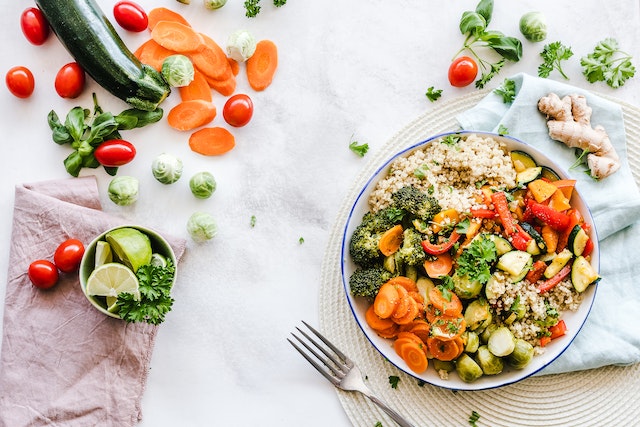Holidays have shifted over the past decade. In years before, the focus of the holidays was less on material wealth and more on the wealth that comes from spending time with families and the people you love. We’re not complaining about getting presents, but sometimes the holidays are hard on our health.
We often put the needs of others above our own in the spirit of the holidays. For some, that means overspending on their loved ones and risking their financial health. For others, that might mean over-exerting their stomach and digestive systems by being guilted into eating food. Still, others face extreme stress during the holidays – which can lead to mental health issues like depression, anxiety, and worse.
More often than not, the holidays wreak havoc on our bodies and minds, even though they are supposed to be a time of joy. The holidays can be pleasant without being too destructive if we learn to set boundaries for ourselves and plan our time accordingly. With holiday meals quickly approaching, we gathered insights from Herbalife Nutrition- a global leader in fitness and wellness – to give our readers the latest advice in healthy eating and meal management.
Here are six tips we came up with from looking into Herbalife Nutrition for helping you and your loved ones stay sane so you can better enjoy your presents and presence.
1) Put the focus on
being present and mindful of your habits — don’t worry about others.
If you’re watching what you eat during holiday get-togethers, it might be tempting to bring it up or encourage others to follow in your footsteps. After all, if you’ve started listening to your body, exercising for your health, or strength training and seen great results. It’s natural to be passionate about it.
One tip to help others with their health – don’t bring it up.
The holidays are stressful, and in a recent medical study, 72% of people researched for the case study that they experience body shaming from their family. At what time, other than the holidays, do we spend more time with our families? Body shaming only ruins an otherwise perfectly good time. It can also take a toll on mental health during a time when mental health is a huge issue.
The same study saw a direct correlation between weight bias and poor mental health. In addition to this, 24% of people diagnosed with mental health issues said their symptoms were extremely high during the holidays, and 40% said they were higher than usual. For the sake of mental health — leave the weight talk between your loved ones and their medical professionals.
Also know that it is okay to say no to things — even if your family is pressuring you. Part of intuitive and mindful eating is learning when to say no after you’ve had enough to eat.
2) Be okay with abundance.
People eat differently during the holidays — and that’s okay! Studies have shown that the more we restrict certain foods, the more we crave them. Permanent restrictive eating can lead to disordered eating, including bingeing, purging, and other long-term and debilitating disorders — and might even be a cause of increased weight. Instead of shaming yourself for eating more or differently during the holidays, listen to your stomach and your mind. If you’re hungry, eat — your body is very good at sending hunger signals when you look carefully.
That being said, don’t eat because you are bored, as many of us are apt to do at holiday get-togethers. Be the cool one and keep people up, moving, and interacting with one another. Bring board games to play right after eating, offer to take your nieces and nephews for a walk, or get karaoke set up in the living room. Part of living with abundance during the holidays means learning that there’s more to abundance than the amount and types of food you eat.
3) Offer your favorite healthy alternatives rather than dieting advice.
Instead of focusing on health interventions during the holidays, take the time to lead by example and let people come to healthy, mindful eating at their own pace. You can do this in several ways. Offer to bring a staple to a family get-together, like stuffing or pie, and find a healthy alternative recipe for these packed with nutrients. Or opt to bring an exciting new dish for the meal. Making a healthy but tempting new dish that people want to try encourages them to branch out of their comfort zones and substitute something like extra pie for a bold fruit dish.
If you’re feeling extremely
ambitious, you might also offer to host a holiday meal or party. That way, you
get to do up the mains as healthy as you’d like, and your guests can choose
what they want to bring. Just make sure that your hosting does not get in the
way of your own mental and physical health goals.
You’ll find that when you make your meals less about forcing health and more about giving people healthy options, the atmosphere, and your relationship with others will change for the better.
4) Keep your mental health in check and eat to satisfy your mind as well as your body.
It is, of course, essential to keep your body healthy and active during the holidays. Amid all the tasty goodies, it can be hard to remember to eat yogurt to keep your gut healthy, down a salad to keep your iron levels high, and eat protein-rich foods (other than delicious deviled eggs). But remember that activity and physical maintenance is not the only issue we encounter during the holidays. As the nights grow darker and it gets colder, we spend much less time outside. This leaves us vulnerable to depression, anxiety, and many other mental illnesses.
Be sure to listen to your mental state as well as your physical. Eat nutritious foods full of vitamin D (like dairy), Omega-3 fatty acids (fish and nuts), folic acid and alpha-lipoic acid (tomatoes) as well as eating your fruits and veggies. Going to the gym, group exercises, and doing yoga are also great ways to fend off winter-onset mental illness.
Lastly, if you feel like you need a break day — take one. Sometimes, your body needs to rest. You should get worried only if you feel like every day needs to be a rest day. Excess need for sleep, a change in mood, or rapid weight fluctuations might be a sign that your mental health is not doing so well. Try to keep a routine, including rest days, and if you notice a change in your weight, mood, or sleep routines without much having changed in your regular routine, then see your doctor before you make any other changes.
5) Set boundaries and goals unrelated to the holidays.
It can be easy to get distracted from daily life during the holidays, which leads to a buildup of stress, body aches, and more. In your merrymaking, be sure to think about the big picture – not just the next few weeks.
Keep training for the 10k you’re doing in the spring. Keep up with your daily meditations, and don’t skip any medication you might be on. Make a budget for presents and stick to it. Holistic health includes other areas of your life. By setting boundaries and goals that keep you grounded for the rest of the year, you’ll be healthy before, during, and after the holidays.
6) Meal plan to make sure you’re getting the most out of your diet, your time, and your wallet.
Did you know that 20 % of food purchased by Americans ends up in landfills? If this statistic isn’t enough to scare you, then think about this. Americans statistically eat out more if they don’t plan weekly meals, which impacts the quality of their meals as well as the amount they spend over a year. If only people knew just how simple meal planning was, we wouldn’t have this issue. Meal planning not only takes the stress out of prepping for dinners when we’re tired from work or trying to save money, but it also saves a ton of food waste from going into a landfill.
On top of that, meal prepping is a great way to make sure that you’re eating a variety of different foods – including fruits, vegetables, and healthy proteins. When you fail to plan your meals, it can be easy to forget to include a particular ingredient in your diet. Planning out what you’re going to eat for the week ahead gives you time to think about what you need to purchase, save easy meals for the day you’re busiest, and get an overarching idea of what your week’s nutrition looks like. Prepping for a two-person household takes about 2-3 hours on average per week, which isn’t that long in the scheme of things. Additionally, it gives you time to catch up on all the podcasts that have been queueing in your podcast app.
It is possible to stay healthy, happy, and sane during the holidays. By setting limits and goals, you prepare yourself for a change in your daily routine as well as preparing yourself for years to come. Follow Herbalife Nutrition’s health and wellness blog for more ideas on how to step up your daily routine for continued success.


